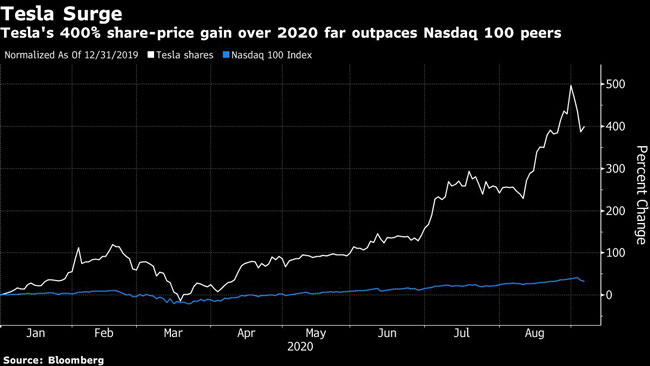Bloomberg News
US Stocks Sink to 4-Week Low in Latest Tech Rout

[Ensure you have all the info you need in these unprecedented times. Subscribe now.]
The selloff in U.S. technology shares picked up speed as investors fled the high fliers who fueled the historic five-month rally from the pandemic lows. Oil plunged, while Treasuries rose with the dollar.
Volatility gripped financial markets, sending the Nasdaq 100 down 4.5% and leaving it 11% off its record set Sept. 2. Tesla sank almost 20% in one of its worst routs as a public company and is now down 33% in September. Apple’s 5.9% plunge wiped out $124 billion in market value Sept. 8, while its three-day slide swelled to 13%, the most since 2008.
Investors have been spooked by the last leg of a rally that drove valuations to levels last seen in the dot-com era. Few pockets of the market were spared, with 440 S&P 500 members lower and only five Nasdaq 100 components higher. The broader index hit the lowest since Aug. 11. West Texas Intermediate crude slid toward $36 a barrel in New York.

The speculative fever that drove huge bullish bets in options markets and saw shares in bankrupt companies surge has broken in September, wiping out trillions in market value. The hardest hit sectors remain sharply higher for the year, stoking a debate among strategists over whether the latest pullback is a sign of market health or the start of a larger drawdown that has further to go.
“Some froth has come off the market which is a good thing, but keep in mind that we still remain well over levels that could be considered ‘fair value’ in stocks,” Tom Essaye, a former Merrill Lynch trader who founded “The Sevens Report” newsletter, wrote in a note. “And while the outlook for stocks remains generally constructive long term, there’s a lot more downside in this market if we get any major disappointments.”
For now, traders sought the safety of haven assets, pushing Treasury yields lower and strengthening the dollar. Gold declined.
The U.S. and China relationship is also back in focus after President Donald Trump said he plans to end America’s reliance on the country. Trump also threatened to punish any American companies that create jobs overseas, and to forbid those that do business in China from winning federal contracts.
“The path of least resistance for the market may well be to test the downside,” said Peter Chatwell, head of multi-asset strategy at Mizuho International Plc. “Ultimately, if there is more selloff, I suspect real money investors will take the opportunity to buy the dip.”
In the U.K., the pound weakened and stocks slumped after Prime Minister Boris Johnson vowed he “won’t back down” over sticking points in Brexit trade talks with the EU.
Elsewhere in markets, the Turkish lira weakened to an all-time low against the dollar for a fourth session amid concern that monetary policy remains too loose to backstop the currency.
Equities rose in Asia, with shares in Australia and South Korea leading the advance.
Want more news? Listen to today's daily briefing:
Subscribe: Apple Podcasts | Spotify | Amazon Alexa | Google Assistant | More




